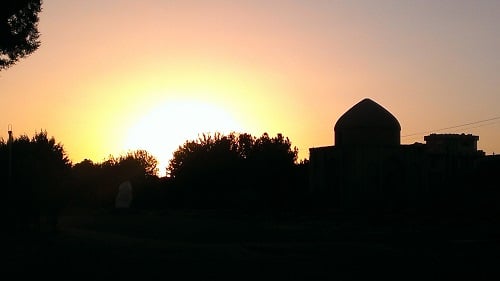Reflections from Kabul—JKCF Graduate Scholar Huma Saeed
 After earning a B.A. in Political Science at the University of Maryland, Baltimore County, and a Master of Science in Human Rights at the London School of Economics, 2009 Graduate Scholar Huma Saeed is now pursuing a Ph.D. at the Institute of Criminology at the University of Leuven in Belgium.
After earning a B.A. in Political Science at the University of Maryland, Baltimore County, and a Master of Science in Human Rights at the London School of Economics, 2009 Graduate Scholar Huma Saeed is now pursuing a Ph.D. at the Institute of Criminology at the University of Leuven in Belgium.
Photo: Kabul residential hills as viewed from the Ministry of Refugees and Returnees
With a focus on “state economic crime in relation to the violation of socio-economic rights,” Huma’s fieldwork brought her to the transitional Middle East city of Kabul, Afghanistan, on a two-and-a-half-month visit in August 2014. She recently shared a written reflection about her experience with the Jack Kent Cooke Foundation.
The 3,500-year-old city of Kabul has seen rulers as diverse as the Hellenistic Seleucids and more recently the Taliban insurgency. It is the fifth fastest growing city in the world and has become greatly diverse over the past few years in a post-9/11 world. Fascinated by the changing and contentious social, political, religious, and economic landscape of Kabul, Huma writes about the democratic election she had the opportunity to research firsthand. In April and again in June, Afghanis headed to the polls despite threats of violence from various groups. For many, job interviews, government funding, and even certain public jobs were put on hold until results of the election were announced. However, Huma shares that, “On a number of occasions, I heard fellow Afghans stating that they felt so proud when millions voted, and prouder yet for the ability of the national security forces to protect them during voting.”
The ten-year reign of Hamid Karzai, at times a controversial figure, ended on September 29 with the appointment of current President Ashraf Ghani Ahmadzai.
Huma was also intrigued by the precarious housing situations of a number of the city’s inhabitants. The city is designed to hold 1.5 million people but an in-rush of international and rural citizens has brought that number to a cramped 5 million. Under Karzai many post-civil war returnees sought to rebuild their former homes and many created shahraks: small, unaesthetic—if not illegal—cities created to house numerous shelterless Kabulis. In addition, corruption makes land ownership in Afghanistan’s capital a murky subject:
Land grabbing in Kabul…a phenomenon as rampant as corruption itself, or perhaps because of it. Other mansions have also been built thanks to the revenues from endemic corruption and narcotics. Most of them, which are built with an appalling taste and are sometimes labeled as narcotecture or poppy palaces, are rented by international organizations and sometimes embassies.
 Gowharshad Mausoleum
Gowharshad Mausoleum
“In short,” she writes, “all this political, cultural and social intensity sometimes gives the feeling that the city is at the verge of bursting; as if it wants to give birth. To what, however, we do not know.” Her reflection documents the positive youth movement stemming from the city’s universities, and it shows how women’s rights, political efficacy, and even the cinema are presenting themselves as avenues for change.
We are pleased to share this Cooke Scholar’s insightful essay. You may read Huma’s piece titled “Backward or forward, that is the question” in full by clicking here.